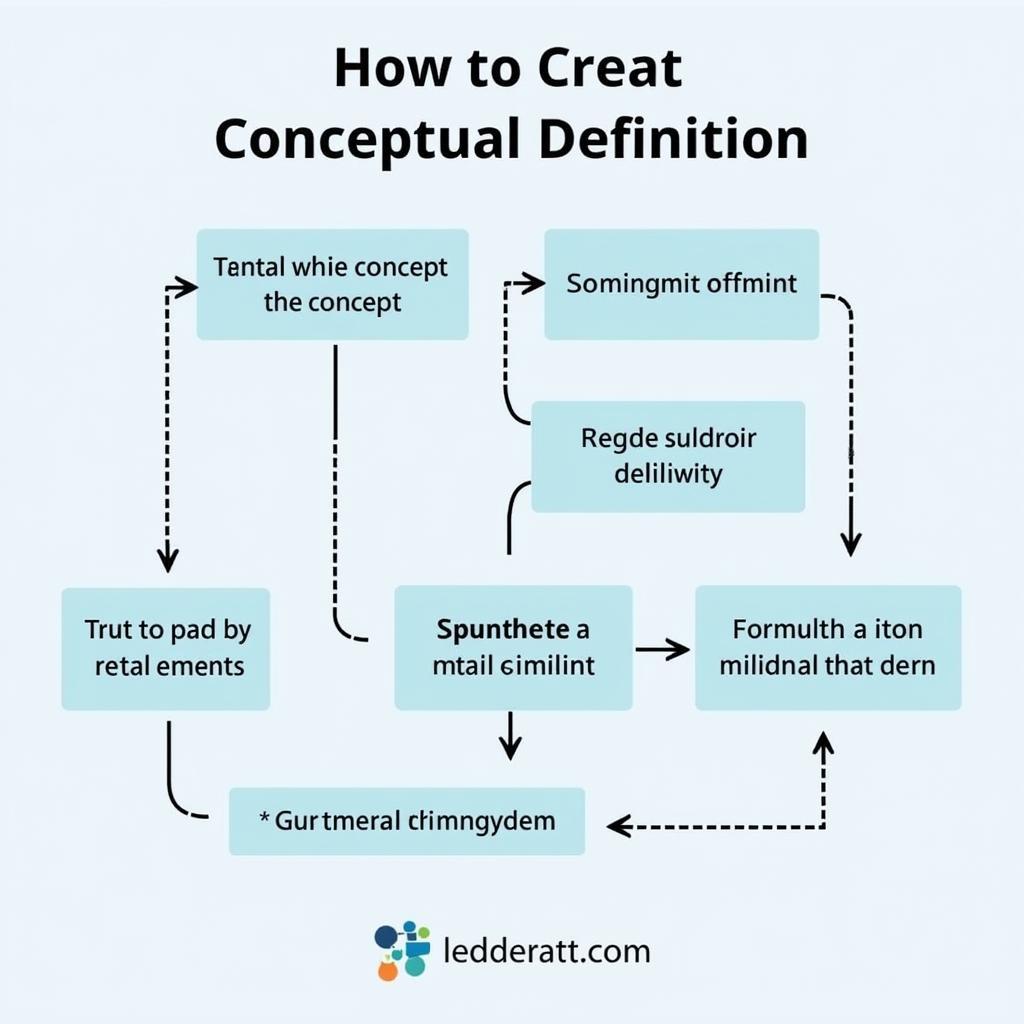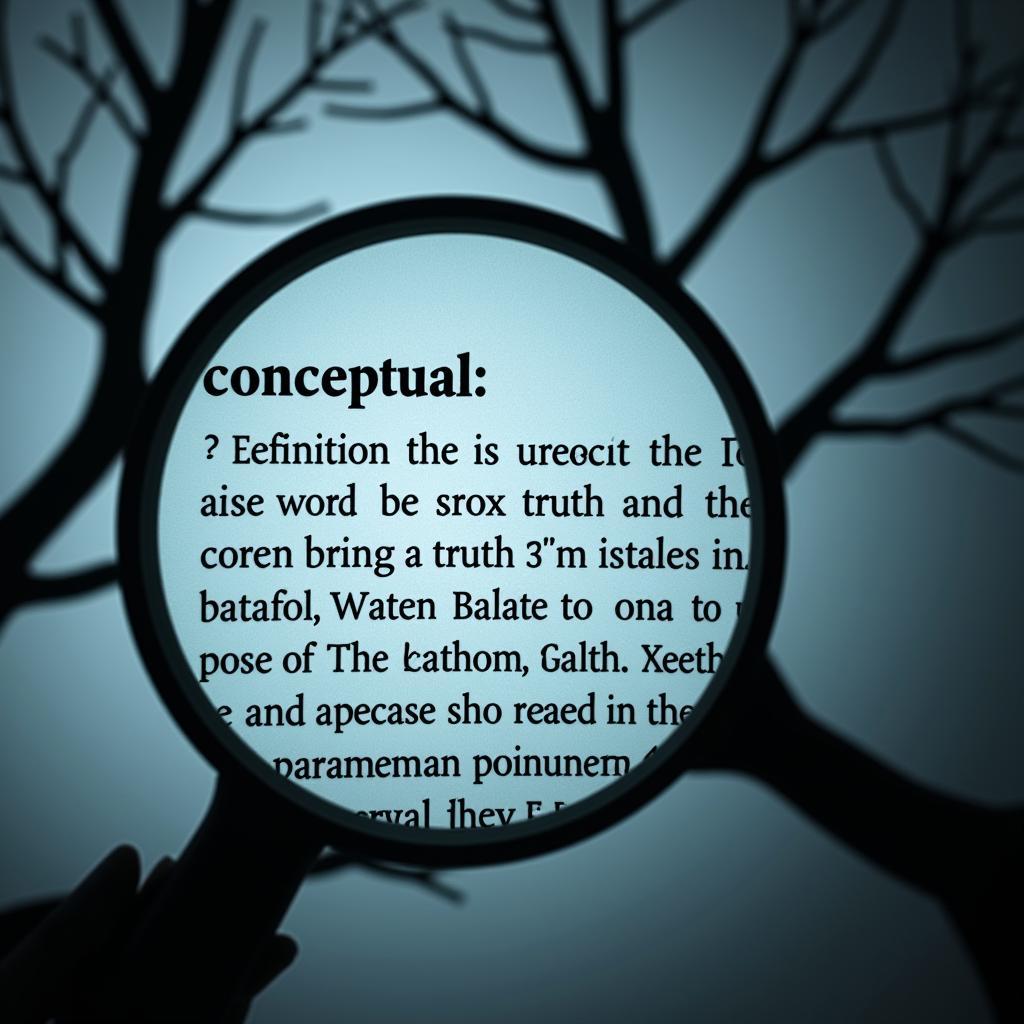Research Conceptual Definition is fundamental to any research endeavor. It involves clearly defining the key concepts and variables used in your study, ensuring everyone is on the same page and your research is focused and impactful. A robust conceptual definition sets the stage for effective measurement and analysis, ultimately contributing to the credibility and validity of your findings. This article delves into the nuances of conceptual definitions, exploring their importance and providing practical guidance on crafting them effectively within the realm of paranormal research. See our article on conceptual definition in research for more detail.
What is a Research Conceptual Definition?
A conceptual definition, also known as a constitutive definition, describes a concept in terms of its characteristics and relationship to other concepts. It’s like creating a mental blueprint of the idea you’re investigating. Think of it as painting a picture with words, helping readers grasp the essence of your research focus. This definition is abstract and theoretical, providing a general understanding rather than specific instructions on how to measure it. For instance, in paranormal research, “haunting” could be conceptually defined as “a persistent anomalous phenomenon localized to a specific location, often attributed to the presence of deceased individuals.”
Why are Conceptual Definitions Crucial?
In any research field, especially one as nuanced as paranormal investigation, precise language is paramount. Without a clear research conceptual definition, ambiguity can creep in, leading to misinterpretations and flawed conclusions. Conceptual definitions provide a common language for researchers, ensuring consistent understanding and facilitating meaningful comparisons across studies. Imagine investigating “psychic abilities” without defining what those abilities entail. The results would be subjective and difficult to analyze. A solid conceptual definition helps us bridge the gap between abstract ideas and measurable variables.
Crafting Effective Conceptual Definitions
Developing a robust conceptual definition requires careful consideration and a deep understanding of the concept being investigated. It involves more than just looking up a dictionary definition; it requires synthesizing information from various sources and tailoring it to the specific context of your research.
Steps to Define a Concept:
- Identify the concept: Pinpoint the core concepts central to your research question.
- Review existing literature: Explore how other researchers have defined the concept in related studies.
- Synthesize information: Combine and refine the information gathered to create a comprehensive understanding.
- Formulate a clear and concise definition: Articulate the concept in a way that is both specific and accessible.
- Contextualize the definition: Explain how the concept relates to the specific research question and hypotheses.
 Conceptual Definition Process in Research
Conceptual Definition Process in Research
Conceptual Definitions in Paranormal Research: An Example
Let’s consider “Electronic Voice Phenomena” (EVP). A simple dictionary definition might refer to electronically generated noises resembling speech. However, a research conceptual definition for paranormal investigation might be: “Electronically recorded sounds, captured under controlled conditions, that are interpreted as anomalous voices and cannot be readily explained by conventional sources or known environmental factors.” This definition provides a more specific and relevant framework for investigating EVP. You can find further examples in our post on example of conceptual definition in research.
Common Pitfalls to Avoid
While crafting conceptual definitions, researchers often encounter certain challenges. Here are some common pitfalls to avoid:
- Circular definitions: Defining a concept using the concept itself.
- Overly broad definitions: Definitions that are too general and lack specificity.
- Overly narrow definitions: Definitions that restrict the scope of the concept too much.
- Lack of clarity: Definitions that are ambiguous and difficult to understand.
Conclusion: The Foundation of Sound Research
Research conceptual definition is the cornerstone of any rigorous research project, especially in the enigmatic realm of paranormal studies. By carefully defining the concepts under investigation, we establish a shared understanding, enhance the validity of our findings, and contribute to a more nuanced and meaningful exploration of the unknown. A strong conceptual foundation empowers us to delve deeper into the mysteries of the paranormal world with greater clarity and precision. Learn more about conceptual research.
FAQ
- What is the difference between a conceptual and operational definition? A conceptual definition explains what a concept means, while an operational definition describes how it will be measured.
- Why are conceptual definitions important in paranormal research? They provide a common framework for understanding and investigating often subjective and ambiguous phenomena.
- How do I create a strong conceptual definition? Review existing literature, synthesize information, and articulate a clear, concise, and contextualized definition.
- What are some common mistakes to avoid when defining concepts? Circular definitions, overly broad or narrow definitions, and lack of clarity.
- Can a conceptual definition change during the research process? While it’s ideal to have a clear definition from the outset, it can be refined as the research progresses and new insights emerge.
- Where can I find examples of conceptual definitions in Paranormal Research? Explore academic journals, books, and reputable online resources dedicated to paranormal studies.
- How does a conceptual definition contribute to the validity of research findings? It ensures clarity and consistency in how concepts are understood and measured, leading to more reliable and meaningful results.
 The Importance of Conceptual Definitions in Paranormal Research
The Importance of Conceptual Definitions in Paranormal Research
Need Help with Your Paranormal Research?
Contact us! We are available 24/7 to assist you with your inquiries.
Phone: 0904826292
Email: research@gmail.com
Address: No. 31, Alley 142/7, P. Phú Viên, Bồ Đề, Long Biên, Hà Nội, Việt Nam.
Check out our other helpful resources: definition of conceptual research and conceptual definition example in research.